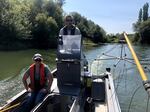Last year we reported on how the Coquille Tribe was using a special electrified boat from the Oregon Department of Fish and Wildlife to remove invasive bass. Now we have an update on how that effort’s being doubled.
Last summer, the ODFW’s Gary Vanderohe explained how his agency’s boat worked, as he took us up the Coquille River to find and zap invasive smallmouth and striped bass.

In this September 2021 photo, Helena Linnell of the Coquille Tribe (seated) and Gary Vanderohe of the ODFW (center) take his agency's electrified boat up the Coquille River to zap and remove invasive bass.
Brian Bull/KLCC
“We have a generator that’s underneath the seat, and then there’s a box in the steering console that converts the electricity — which is an AC electricity- into a DC electricity, which is a little bit easier on the fish, it just kinda stuns them,” he said.
The electrical current stuns all the fish near the boat. Once the fish float to the surface, netters scoop them up and deposit them into a tank where they’re later measured and recorded. The invasive bass are then kept and given to the birds at the Cascades Raptor Center. If a salmon or other noninvasive fish is stunned, they are returned to the water and swim away.
This year, through a $100,000 grant from the Confederated Tribes of the Grand Ronde’s Spirit Mountain Fund, the Coquille will soon have their own craft.
Helena Linnell, biological planning and operations manager for the Coquille Tribe, explained why it’s vital to remove bass.
“They’ve been here for over a decade, and they are having decimating effects on salmonids,” said Linnell, adding the bass also endanger other native aquatic species in the area.
The tribe expects to have the boat delivered next year, so they and the ODFW can double-team the invasive bass beginning in 2023.